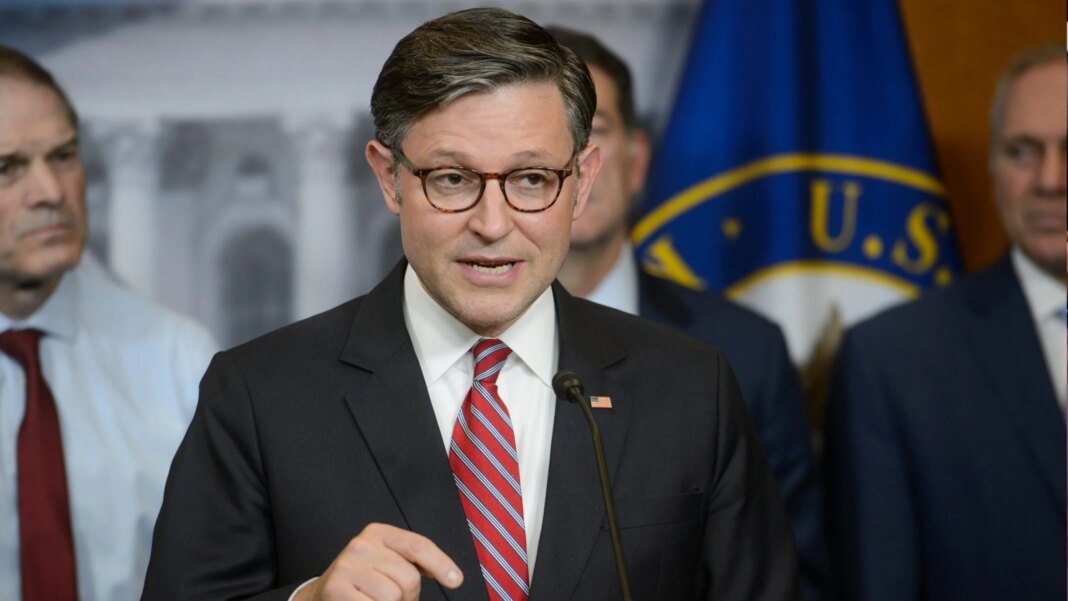A Looming Crisis: The Government Shutdown
As we stand at the crossroads of a significant political stalemate, the ongoing government shutdown has stirred anxiety and uncertainty in various sectors. Republican House Speaker Mike Johnson has openly predicted that the current shutdown may soon become the longest in U.S. history, firmly stating he “won’t negotiate” with Democrats until they agree to pause their health care demands.
Timeline of the Shutdown
On the 13th day of the shutdown, Johnson addressed an array of pressing concerns, notably the massive layoffs of federal workers initiated by the Trump administration. This maneuver has been characterized by many as an attempt to capitalize on the shutdown to reduce the size and scope of government operations.
In the middle of this turbulence, Vice President JD Vance has signaled that “painful” cuts are on the horizon, a situation that’s compounded by ongoing lawsuits from employee unions opposing these drastic measures.
Current Landscape
This shutdown is far from a mere administrative inconvenience; it has brought government operations to a grinding halt, affecting everything from federal museums to airport operations. With the House out of legislative session and Johnson declining to summon lawmakers back to Washington, little progress appears to be made. The Senate, although scheduled to reconvene, finds itself mired in a quagmire of failed votes, primarily due to the Democrats’ refusal to compromise on critical health care issues.
As the days pass, it becomes increasingly evident that without negotiations, the outlook is bleak. The looming deadline for Americans seeking health care coverage — November 1st — raises the stakes high, as millions depend on the Affordable Care Act (ACA) subsidies that are set to expire at the end of the year.
The Health Care Debate
At the heart of the shutdown is a long-standing battle over health care policy. The ACA subsidies support uninsured Americans in purchasing health insurance on the Obamacare exchanges, and their expiration would drastically affect affordability. Republicans are hesitant to negotiate until the government is reopened, while Democrats argue that the crisis needs to be resolved immediately.
House Democratic leader Hakeem Jeffries has expressed frustration with the House’s inaction, stating that Republicans have essentially left the chamber shut down for weeks. He contends that without reasonable negotiations, the path to resolution remains blocked.
The Economic Impact
The shutdown has broader implications as well. With essential operations paused, anxiety about disruptions in air traffic and other sectors is palpable. Economists warn that prolonged governmental closure can exacerbate an already fragile economy, as public confidence is shaken and businesses face uncertainty.
A History of Shutdowns
The ongoing debate over health care in this shutdown echoes previous conflicts, notably during the Obama administration, which saw a 16-day shutdown over an unsuccessful attempt to repeal the Affordable Care Act. Similarly, former President Trump attempted a “repeal and replace” strategy during his first term, efforts that were famously derailed by then-Senator John McCain.
Now, with 24 million individuals currently enrolled in ACA plans, Johnson himself has noted skepticism about future repeal efforts, indicating the deep-rooted nature of the ACA within the fabric of American health care.
Legislative Deadlock
As Congress remains in gridlock, attention shifts to the impending deadlines surrounding health care enrollment and funding for federal employees. With numerous government workers facing the prospect of delayed pay, the pressure is mounting on leaders from both parties to seek a way forward.
Johnson has expressed gratitude to President Trump, who has managed to ensure military personnel receive pay during the shutdown, alleviating some pressure for immediate action. However, the ramifications for other governmental departments, particularly education, are severe, with multiple programs facing substantial disruption.
The Role of Funding Sources
The strategic use of available funding sources complicates the picture. The Pentagon, for instance, has tapped into unused research and development funds to pay military personnel, illustrating that not all departments are equally affected. The flexibility afforded to the Trump administration allows for targeted financial maneuvers that can mitigate the impact on certain agencies while leaving others vulnerable.
Conclusion
The current shutdown illustrates the deeply entrenched disagreements within American politics, particularly regarding health care. While the clock continues to tick on negotiation opportunities, the future remains uncertain as millions of Americans watch closely to see how this standoff unfolds. The stakes could not be higher — both for the careers of congressional leaders and for the lives of everyday Americans who find themselves at the mercy of political machinations.



